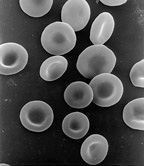
Photo from wikipedia
Background: Any maternal history of blood loss, ABO or Rh incompatibility, and hydrops fetalis often leads to suspicion of neonatal anemia postnatally. When maternal history consists only of decreased fetal… Click to show full abstract
Background: Any maternal history of blood loss, ABO or Rh incompatibility, and hydrops fetalis often leads to suspicion of neonatal anemia postnatally. When maternal history consists only of decreased fetal movement, recognition of neonatal anemia can be problematic. Clinical Findings: This case was a transported late preterm neonate who presented initially with persistent hypoxia unresponsive to usual respiratory support. On examination, mild paleness was noted. Primary Diagnosis: Anemia caused by fetal–maternal hemorrhage was the ultimate diagnosis confirmed by a Kleihauer-Betke test on maternal serum examining fetal cells. Interventions: Neonatal resuscitation included positive pressure ventilation, oxygen, and intubation. However, oxygenation did not improve prompting consultation with the neonatologist. Sedation and a paralytic were given. A chest radiograph ruled out pneumothoraces and pleural effusions as causative. Initiation of inhaled nitric oxide produced a mild response. Eventually, the transport nurse obtained a complete blood count indicating severe anemia, which prompted an emergent blood transfusion. The accepting neonatology team consulted with the obstetrician and a Kleihauer-Betke test was performed on mother's blood confirming a large fetal–maternal hemorrhage. Outcomes: This neonate responded well to blood transfusions, a pressor, and respiratory support and was discharged home at 7 days of life. Practice Recommendations: Recognition of postnatal anemia is vital to sustaining life and this can occur in the transport environment. When maternal history is nonspecific and a neonate is hypoxic, uncommon causes of hypoxia can be identified with consultation and a complete blood count.
Journal Title: Advances in Neonatal Care
Year Published: 2019
Link to full text (if available)
Share on Social Media: Sign Up to like & get
recommendations!